
With Civilization V apparently at the end of its life cycle and unlikely to receive any more major updates or expansions, it's time to start looking to the future of the franchise: Civilization VI. Civ V was successful enough to spawn several spin-offs: Beyond Earth, Civilization Revolution 2 on mobile devices, Civilization World, and even a Civilization MMO. So it's reasonable to assume that if work hasn't already started on Civlization VI, then it will begin soon.
One of the things that I most love about Civ V is that each civ has unique powers that give them their own playstyles and flavors. The expansions (especially Brave New World) showed a lot of creativity with some of the civilizations. I hope that these design philosophies continue, and that we'll see some even more interesting gameplay variations in the new civilizations of Civilization VI.
To that end, I have a few ideas and suggestions for designs and themes for some of the common civilizations that are likely to appear in Civilization VI. I'll provide at least a unique abilility and at least two unique units / buildings / improvements, but I may also provide additional or alternative unique suggestions in case Firaxis decides to include even more variety and specialization. Since Civ VI will likely be a whole new game on a whole new engine, I can't give specific examples of the mechanics of these ideas. Instead, I'll try to focus on more broad concepts and maybe include examples based on Civ V's mechanics and features if relevant.
* NOTE: this post is a work-in-progress, and will probably be revised as I come up with additional ideas or clarifications. [More]
38b32f22-6121-4eec-82dd-ddc90cb4ce5d|0|.0
Tags:Sid Meier's Civilization, civilization, ability, unique, America, minuteman, Egypt, Nile, war chariot, Greece, city state, philosophy, hoplite, Huns, Mongols, nomad, Japan, Bushido, samurai, katana, dojo, ninja, Rome, road, legion, forum, Byzantium, cataphract, musketeer, immortal, MiG fighter, spitfire, Civilization III, Civilization IV, Civilization V, Civilization VI
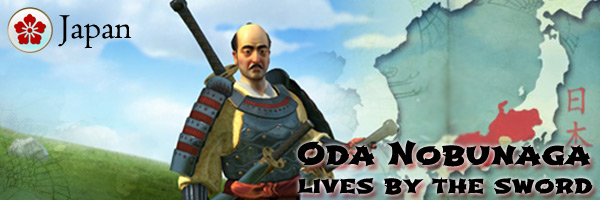
Continuing my series of strategy posts about Brave New World's modified civilizations, I'm going to take a look at strategies for Oda Nobunaga's Japan. Since Brave New World's Fall patch Japan was given additional buffs towards culture and coastal starts.
Japan is a series of four large island and numerous smaller islands that were formed by volcanoes. It has been inhabited since the upper paleolithic era (about 30 thousand years ago), and its people have lived in relative isolation for much of its history. It has gone through periods of war with its closest neighbors across the sea: China and Korea, and has had significant cultural influences from both, such native Shinto's two competing religions: Buddhism and Confucianism. Throughout most of Japanese history, the country has been in a feudal state, with regional populations being loyal to a warlord who is granted land and titles from the emperor (or "Shogun"). In-fighting between warlords was common, and power often ebbed and flowed between different clans and families.
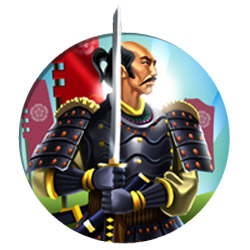
Samurai Daimyo Oda Nobunaga helped Ashikaga Yoshiaki to reclaim the title of Shogun for his clan in 1568, and Nobunaga used the leader as a puppet to enable his own conquests. He was a brutal warrior who once set fire to an enemy complex, killing tens of thousands of civilian non-combatants (including women and children) in order to put down a rebellion of farmers and monks. He eventually attained military control of more than half of the territories of Japan on behalf of the Shogun. His successor, Hashiba Hideyoshi, would complete the unification of Japan 11 years after political and personal tensions lead to Nobunaga's assassination by a vassal clan.
In the 19th century, Japan's isolation finally ended and it began the process of rapidly modernizing. By the 1930's, Japan had developed into a modern military-industrial machine that was almost the technological equivalent of the United States and European powers. It became the dominant power in the Pacific prior to being defeated by the United States in the second half of World War II. [More]
1cad9ae0-1148-4d92-80d2-cc7859222fda|3|5.0
Tags:Sid Meier's Civilization, Civilization V: Brave New World, Civilization V, Japan, Oda Nobunaga, Bushido, daimyo, shogun, Zero, culture, tourism, sea resources, fishing boats, sushi, longswordsman, fighter, warmonger, samurai, Civ V Fall Patch, Civ-V

I was finishing up my Civ V: Brave New World strategies this fall, and thought that I'd finally have some time to play other games besides Civilization. Firaxis and 2K, however, had other plans. Instead of being able to play other Steam games and getting back to my PS3, instead, I now have Civ in SPACE!
I guess I can't escape Civ so easily...
So is Beyond Earth going to hold my attention, keep me up till 3 in the morning playing "one more turn", and monopolize my PC gaming? Or will it be a short diversion before being shelved in favor of other games?
Table of Contents
Most of the gameplay mechanics of Beyond Earth are variations of equivalent mechanics in Civilization V, with more or less complexity. This makes the game very accessible and familiar for most Civ players, but it also means that Beyond Earth isn't really pushing any gameplay boundaries. Whereas Civ V's transition to a hex grid revolutionized the series, Beyond Earth just feels like more of the same.
Most of the added complexity works in the game's favor, but some mechanics have been simplified such that they almost feel pointless.
Beyond Earth's extraterrestrial setting does play a small factor in the gameplay and differentiates this game a bit from Civilization V. The most prominent displays of this are in the alien life forms and the terrain of the map. The inclusions of canyons as a geography characteristic is mostly superficial, as they function almost identically to mountains. The biggest change is the inclusion of toxic "miasma". Miasma tiles cause damage to units that end their turn on it, and trade units cannot pass through miasma at all.
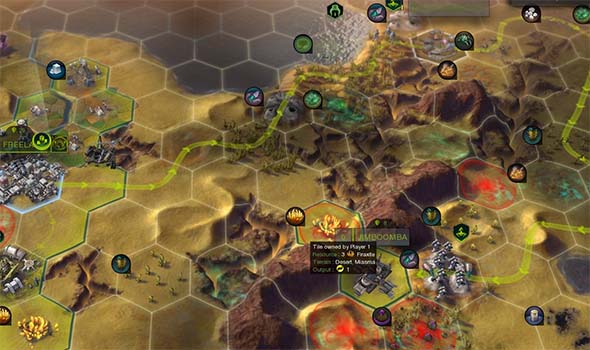
Miasma damages units and blocks trade routes until you unlock the ability to remove it or survive it.
This adds a satisfying challenge and sense of having to deal with a hostile alien environment.
This adds some challenge to the first half of the game, since miasma can force the player to explore and expand differently than they would in Civ V. Miasma can force your workers to have to avoid improving certain terrain, and may prevent explorers from accessing certain regions of the map or completing some expedition sites. It can also prevent your trade units from following direct routes between cities, which can cause them to follow winding paths far outside your inherent zone of control, making them harder to protect.
Contrary to the developers' claims prior to release, the aliens really are just reskins of Civ V's barbarians. They are counted as "enemy" units to every civilization and inflict zone of control automatically. They spawn randomly from nests that function identically to encampments, and even offer monetary rewards for entering the tile and destroying the nest. The only major difference is ... [More]
aed9db83-3047-4b4d-b015-5efe80732985|3|4.0
Tags:Sid Meier's Civilization, Civilization: Beyond Earth, review, science fiction, space, affinity, Firaxis, 2K Games, PC, Steam, strategy, grand strategy, turn-based strategy, alien, Civilization: Beyond Earth

Continuing my series of strategy posts about Brave New World's modified civilizations, I'm going to take a look at strategies for Bismarck's well-rounded Germany. Since Brave New World's fall patch, Germany's unique Landsknecht has been replaced with a Hanse (bank replacement) that makes Germany into a more well-rounded civ rather than being exclusively military-focused.
The region of Germany has been the site of some of the most violent and destructive wars in the history of the world. It was given its name by Julius Caesar, who called the region east of the Rhine "Germania" to differentiate it from Gaul, which he had already subjugated. The region was populated by tribes of Germanic people who were often labeled as barbarians by the Romans who were never able to fully annex the territory. Most of German lands were controlled by the Franks such as Charlemagne following the fall of the Roman Empire, and they would not be united into their own sovereign nation until Otto I would become the first emperor of the Holy Roman Empire in 962 C.E.. When Martin Luther founded the schism religion of Protestantism, the Holy Roman Empire descended into the Thirty Years War, in which the northern Protestants fought for their autonomy against the southern Catholics. Following the war, the lands of Germany were broken up into multiple nation states such as Prussia and Saxony.
In the aftermath of the Napoleonic Wars, a series of social and industrial revolutions drove Prussia into becoming a leading educational and cultural states in Europe, and its Chancellor Otto von Bismarck effectively established the modern Germany in 1871. The German economy grew over the next few decades, but it was defeated in World War I, forced to pay reparations, its leadership was replaced with an unstable republic, and its economy completely crashed. All this lead to a takeover by the National Socialists (Nazis) who rapidly rebuilt Germany's economy and industry and turned it into a war machine that struck with greater speed and efficiency than the world had ever seen. Despite all the bitter bloodshed, a democratic Germany has emerged from the chaos as one of the strongest economies in Europe and is a worldwide leader in technological, scientific, and cultural development (and humor).

Otto Eduard Leopold, Prince of Bismarck, Duke of Lauenburg is known more simply as Otto von Bismarck. He is responsible for uniting the fractured states of Germany into a modern, unified German nation through the use of an efficient military and shrewd diplomacy. He was known to have a violent temper, but was a brilliant statesman and diplomat nonetheless. He became famous for using balance of power strategies to maintain peace in Europe while also furthering his goals as the political leader of Germany. Though he was staunch conservative autocrat, he did pass a series of social reforms that improved the quality of life for Germans. This, combined with his strong leadership, made him beloved by the German people. He was eventually unseated by Kaiser Wilhelm II, whose aggressive expansionist policies are often credited with leading to World War I. [More]
653da07c-1d18-4a6d-8daa-63dd483d304a|3|5.0
Tags:Sid Meier's Civilization, Civilization V: Brave New World, Civilization V, Germany, Bismarck, Otto von Bismarck, Furor Teutonicus, Hanse, Panzer, barbarian, encampment, unit maintenance, unit cap, trade route, production, tank, bank, Landsknecht, city state, Civ V Fall Patch, Civ-V
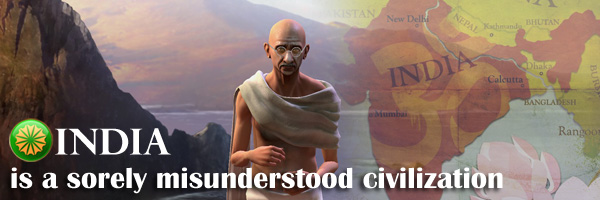
Continuing my series of strategies for Brave New World, I am going to take a moment to discuss one of (if not the) most sorely misunderstood civilizations from the vanilla game: Gandhi's India. India received a very minor tweak in Brave New World (its unique building was modified to provide tourism instead of gold), but the new trade route mechanics radically change the way that India should be played. In some ways, the new features make India feel like a completely new civilization!
The ancient civilization of India is one of the world's most populace and diverse countries. More than 1/6th of the world's population currently calls India home (that's over a billion people!), it is one of the cultural and spiritual centers of the world. India is the birthplace of both the Hindu and Buddhist religions, which make up third and fourth most populous religions today. The less-populous faith of Jainism also has roots in India. In addition to the variety of religions, there are also over 100 distinct languages that are spoken in India! Indian society used to follow a rigid caste system in which a person's status in life is determined at birth. Although this caste system is not enforced (and is actively discouraged by the government), it remains a persistent force in the nation, and still leads to a great deal of prejudice and conflict within the country.
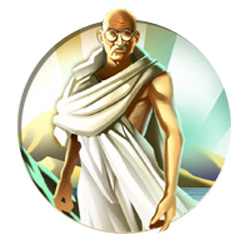
One of the most significant leaders of Indian history (and world history) is Mohandas Gandhi. In the early 1900's, India was under British occupation, and Gandhi, the son of the Prime Minister of the small state of Porbandar, was successful in leading an unprecedented non-violent rebellion to drive the foreign rule out. This peaceful rebellion lead to Gandhi being recognized as one of the most courageous and moral leaders the world has ever known. Indians affectionately refer to him as "Bapu" (translation: "father") in recognition of his role in creating the modern Indian nation. His birthday, October 2, is a national holiday in India, and is celebrated outside of India as the International Day of Non-Violence. Sadly, he was assassinated in 1948 (at age 78) by a Hindu nationalist who believed that Gandhi showed too much favoritism to Pakistan, one of India's bitter rivals. The assassin was tried and executed the following year, and Gandhi's ashes were distributed around the country for numerous memorial services.
Gandhi's representation in Civilization V gets a lot of undeserved criticism from some players, who often cite India as the "worst civ in the game" based solely on the fact that he is the only civ with a penalty explicitly stated in his unique ability (except for Venice in Brave New World), and that his unique unit is in some ways inferior to the unit it replaces. However, it is important to note right off the bat that there are plenty of civs who receive indirect penalties as part of their uniques. But the "Population Growth" ability, itself, is very poorly understood. Many players assume that this means that India must be played with a small empire, and that India cannot compete for any victory except for culture or diplomatic. This is simply not the case, and I'm going to explain why! [More]
53e37110-4392-460c-901d-be3ce7603441|9|4.9
Tags:Sid Meier's Civilization, Civilization V: Brave New World, Civilization V, Gandhi, India, Population Growth, War Elephant, Mughal Fort, tourism, trade route, chariot archer, castle, happiness, unhappiness, cities, PolyCast, atomic bomb, nuclear missile, nukes, ranged mounted unit, Civ-V
|

| 12 | | | | | | | 60 | | 11 | | | | | | | 55 | | 10 | | | | | | | 50 | | 09 | | | | | | | 45 | | 08 | | | | | | | 40 | | 07 | | | | | | | 35 | | 06 | | | | | | | 30 | | 05 | | | | | | | 25 | | 04 | | | | | | | 20 | | 03 | | | | | | | 15 | | 02 | | | | | | | 10 | | 01 | | | | | | | 05 |
|